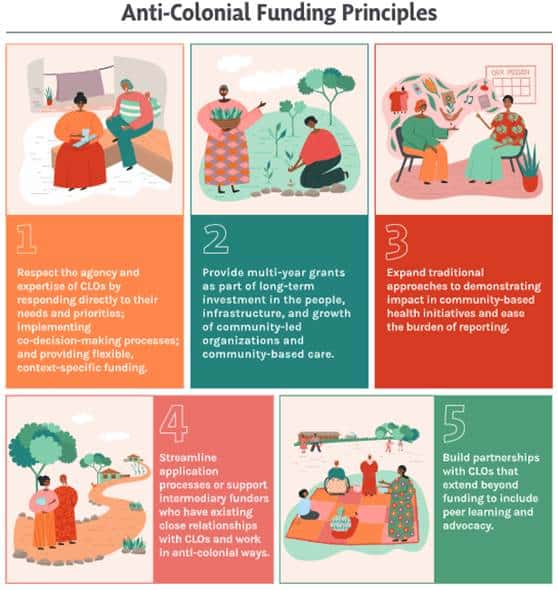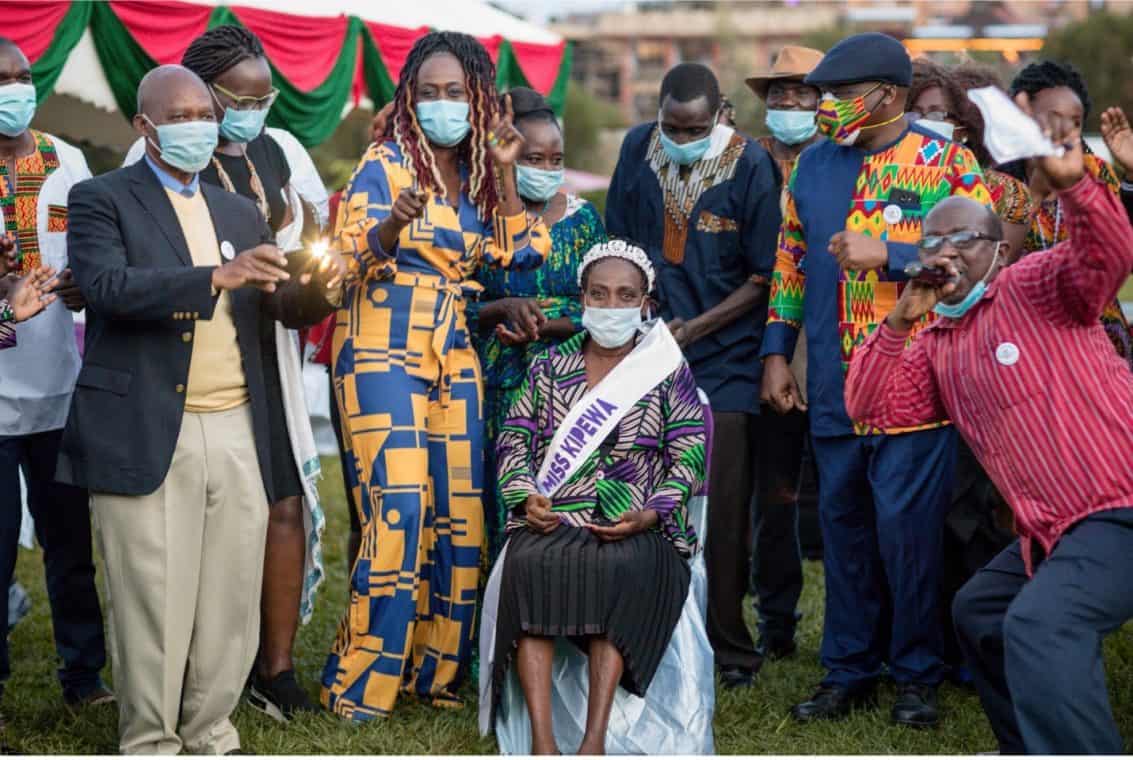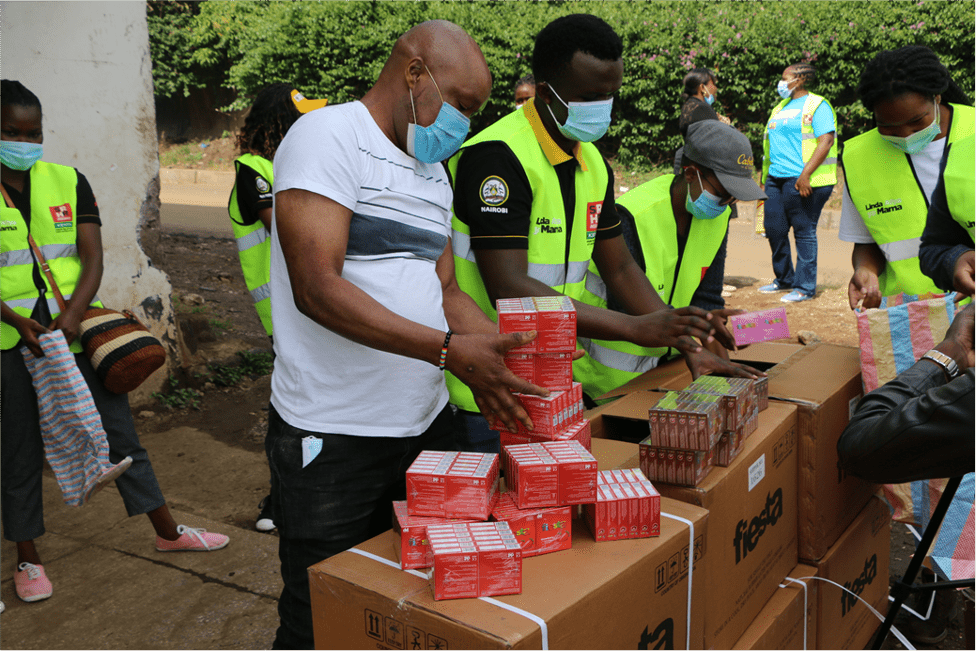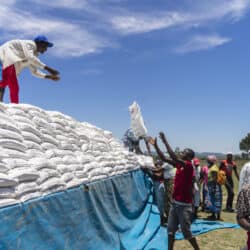A recent convening led the Stephen Lewis Foundation to issue a call to action for funders – outlining five anti-colonial funding principles to remove roadblocks for funding community-led organizations.
Increasingly, international development organizations, foundations, and governments are acknowledging that building a more just and equal world requires that we do philanthropy differently. For many, “localization” has been identified as the way to get there – increasing the percentage of funding that goes to local or national organizations. But what we really need is to fundamentally shift power and resources into the hands of community-led organizations.
This process must start with authentically reflecting on the histories of colonialism that perpetuate racism, undermine human dignity, and put decision-making power in the hands of those who have benefited most from colonialism and capitalism. It means sitting in the discomfort of what honest reflection may yield, including how philanthropic institutions and donor governments from the Global North have maintained and contributed to oppressive systems to our own benefit, ongoing relevance, and self-preservation. Decolonizing philanthropic funding requires deep and ongoing introspection from funders at all levels.
Since 2003, the Stephen Lewis Foundation (SLF) has partnered with community-led organizations to support them in addressing the impacts of HIV and AIDS in their communities and the structural inequalities that perpetuate the pandemic. As a funding organization based in Canada that is working in solidarity with community-led organizations in sub-Saharan Africa, we are continually engaged in reflections on how power and privilege affect our partnerships. True solidarity requires us to address the structural racism and colonial legacies that keep community-led organizations severely underfunded while well-financed multilateral agencies and international NGOs based in the Global North shape the majority of the “development” agenda.
Last year we convened a group of funders and community-led organizations for discussions on how to better mobilize support for HIV-related community-based care in sub-Saharan Africa and how best to get long-term, flexible funding into the hands of community-led organizations. Insights from those conversations, combined with almost 20 years of learning from our partnerships, led us to issue a call to action for funders to take concrete steps to decolonize their funding practices, strengthen their support for community-led organizations, and shift power into their hands.
Our call to action outlines five anti-colonial funding principles that funders can follow to remove the roadblocks traditional funding models present for community-led organizations (CLOs).

1. Respect the agency and expertise of CLOs by responding directly to their needs and priorities; implementing co-decision-making processes; and providing flexible, context-specific funding.
“We have worked in our communities for a long time, and we have the knowledge that will improve the lives of our communities. We need funder and community-based organization collaboration during the conceptualization of the project. And there needs to be a clear understanding that priorities could change during the course of the project.” —Ndinini Kimesera Sikar, founder and executive director of Maasai Women Development Organization (MWEDO), Tanzania
When funders determine a project’s priorities, it constrains CLOs and undermines their ability to respond to changing circumstances. Grant agreements and funding relationships should be rooted in trust and the knowledge that CLOs know what their communities need.
2. Provide multi-year grants as part of long-term investment in the people, infrastructure, and growth of community‑led organizations and community-based care.
“We really need partners who will invest in our organization not just for one project but in a sustained way. Receiving sustained funding from a longstanding partner means that we can do organizational strengthening.” —Grace Waruguru Kiarie, executive director of Kiambu People Living with HIV and AIDS (KIPEWA), Kenya
Too often, funding for CLOs is short-term and project-specific even though their most impactful work is people-centred and ongoing. Long-term, multi-year funding offers a degree of consistency and stability that allows CLOs to focus on expanding holistic programming and creating impact over time.

3. Expand traditional approaches to demonstrating impact in community-based health initiatives and ease the burden of reporting.
“Change takes time, especially when we look at results in a different way from just seeing the numbers. What we want to see are the changes that are actually happening in the community. Reporting should not just be about community-based organizations being able to fill out reporting templates properly. When a relationship with a funder is based on trust, then we can focus on sharing what we’re interested in, especially the story-telling.” —Ndinini Kimesera Sikar, MWEDO
When CLOs have to tailor their monitoring and reporting to meet funder needs, it creates burdens on organizations with already limited resources. Funders need to reconsider their grant requirements in collaboration with CLOs to ensure that reporting requirements are not detracting from the work being done.

4. Streamline application processes or support intermediary funders who have existing close relationships with CLOs and work in anti-colonial ways.
“Being in a country where homosexuality and LGBTI issues are still criminalized is a challenge in terms of fundraising. Restrictions from donors often mean that the organizations who are doing the most impactful work can’t get funding from donors because they don’t have three years of bank statements or audited financial statements. The application process often entails submission of multiple supporting documents, which can be a burden for organizations.” —John Mathenge, founder and executive director of Health Options for Young Men on HIV/AIDS and STIs (HOYMAS), Kenya
Researching and applying for funding takes time and human resources that community-led organizations often do not have. Funders’ overly rigorous due diligence processes and application requirements are onerous for small CLOs to undertake successfully.
5. Build partnerships with CLOs that extend beyond funding to include peer learning and advocacy.
“The best relationships with funders are partnerships. Partnership is not just about money. It’s about how you agree, about how you help each other build, and also about the learning process. In a partnership, our projects are not just about numbers, they’re about human beings.” —John Mathenge, HOYMAS
Building sustained change in communities and health systems requires long-term and patient partnerships between funders and CLOs. These partnerships should extend beyond funding to include active solidarity on the part of funders.

Shifting power dynamics requires building partnerships that are based on trust as well as interrogating our thinking about what makes for good grant management. A starting point is to understand that the visions communities have for themselves, and the expertise they hold, make them best placed to design and implement their own programs to meet their own identified needs. Our work must be rooted in valuing the diverse knowledge, expertise, and power that already exist in communities. These things can be understood only by actively listening to communities about what works for them, what does not, and why. It also means fundamentally redefining what both success and sustainability look like and holding space for unique operational visons and programmatic experiences.
Conventional models of philanthropy and international development, driven by organizations based in the Global North, devalue the expertise and experience of community-led organizations such as MWEDO, HOYMAS, and KIPEWA. Structural racism and the colonial roots of international aid keep power in the hands of funders, infantilize communities, and disregard the significant and continuous investments communities make in their own development.
These inequitable power dynamics will not change simply through an increase in financial support for community-led organizations, though this is a critical step. Funders must reflect on their own funding practices through an anti-colonial lens, engage in ongoing dialogue with community-led organizations, and take concrete action to decolonize their funding practices.


